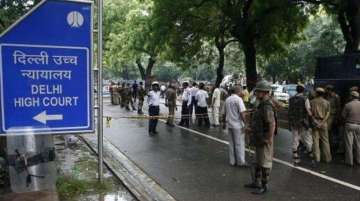The Delhi High Court is hearing a petition filed by one of the convicts in the Nirbhaya gangrape and murder case, Mukesh, challenging the death warrant issued against him. Convict Mukesh had moved the Delhi High Court on Tuesday after the Supreme Court had dismissed his curative petition.
"The petitioner's Constitutional right to seek mercy will be rendered infructuous if the execution warrant dated 7.1.2020 is not stayed," Mukesh said in his petition filed through his lawyer AP Singh.
The plea sought for directions for setting aside the trial court order and not to give effect to the order for execution of death sentence on January 22.
While the hearing is underway in Delhi High Court, the Delhi government has sent Mukesh's mercy plea (filed on Tuesday) with a 'negative consent' to Delhi's LG.
Mukesh files mercy petition
"On 14.1.2020, after exhausting all his legal remedies pertaining to the merits of his case and the sentence of death awarded to him, the Petitioner exercised his constitutional right to seek mercy and addressed a mercy petition to the Hon'ble Lt. Governor of NCT of Delhi under Article 161 and Hon'ble President of India under Article 72 of the Constitution of India.
The Petitioner's mercy petition dated 14.1.2020 was filed and submitted with the Superintendent of Jail, Tihar Jail No 2, where the Petitioner is currently lodged," the plea said.
Petitioner's constitutional right to seek mercy will be rendered infructuous if
"However, the Petitioner's constitutional right to seek mercy will be rendered infructuous if the execution warrant dated 7.1.2020 is not stayed.
Furthermore, the guidelines passed by the Hon'ble Supreme Court of India in Shatrughan Chauhan case holding that there must be a minimum of 14 days' notice between the communication of rejection of mercy petition and the scheduled date of execution, must also be kept in mind, before a scheduled date of execution can be fixed, should the mercy petition be dismissed by the Hon'ble President of India," the plea said further.
A Delhi court had earlier this month while issuing death warrants against the four convicts in the Nirbhaya gangrape and murder case observed that "despite being afforded sufficient time and opportunity" the convicts didn't exercise their legal remedies.
Additional Sessions Judge Satish Kumar Arora said, "It is apparent from the record, sufficient time and opportunity was given to the convict to exercise and exhaust their remedies as available to them under the law. Either the remedies have been exercised and exhausted by the respondents or have not been resorted to despite afforded sufficient time and opportunity."
In these given facts and circumstances when reasonable time and opportunity has been afforded to the convicts to exercise their remedies, there is nothing to delay any further in passing orders on the application seeking issuance of death warrants, the court said further.
Nirbhaya gangrape convicts hanging on January 22
The court has fixed January 22 and 7 am as the date and time of execution for the four convicts.
The 23-year-old victim was brutally gangraped and tortured on December 16, 2012, which later led to her death. All the six accused were arrested and charged with sexual assault and murder. One of the accused was a minor and appeared before a juvenile justice court, while another accused committed suicide in Tihar Jail.
Four of the convicts were sentenced to death by a trial court in September 2013, and the verdict was confirmed by the Delhi High Court in March 2014 and upheld by the Supreme Court in May 2017, which also dismissed their review petitions.
ALSO READ: Nirbhaya rape convict Mukesh files mercy petition
ALSO READ: Supreme Court dismisses curative petitions of two convicts in Nirbhaya rape case
Latest India News
